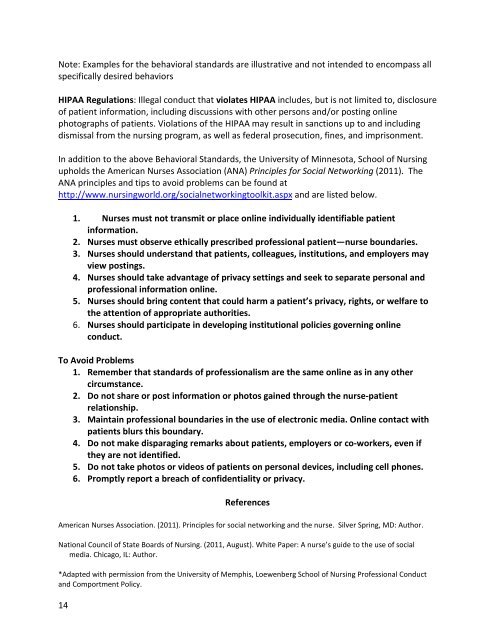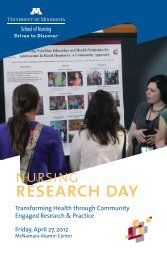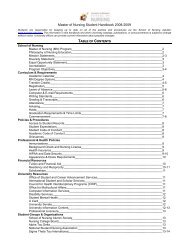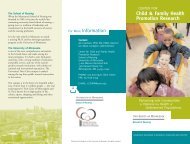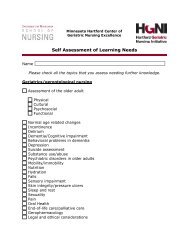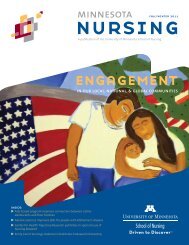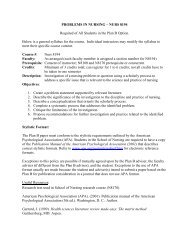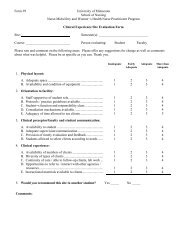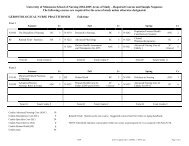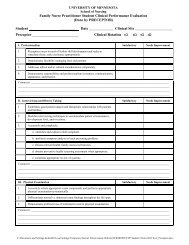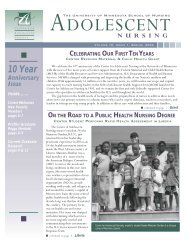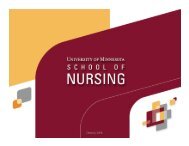BSN Student Handbook - School of Nursing - University of Minnesota
BSN Student Handbook - School of Nursing - University of Minnesota
BSN Student Handbook - School of Nursing - University of Minnesota
Create successful ePaper yourself
Turn your PDF publications into a flip-book with our unique Google optimized e-Paper software.
Note: Examples for the behavioral standards are illustrative and not intended to encompass all<br />
specifically desired behaviors<br />
HIPAA Regulations: Illegal conduct that violates HIPAA includes, but is not limited to, disclosure<br />
<strong>of</strong> patient information, including discussions with other persons and/or posting online<br />
photographs <strong>of</strong> patients. Violations <strong>of</strong> the HIPAA may result in sanctions up to and including<br />
dismissal from the nursing program, as well as federal prosecution, fines, and imprisonment.<br />
In addition to the above Behavioral Standards, the <strong>University</strong> <strong>of</strong> <strong>Minnesota</strong>, <strong>School</strong> <strong>of</strong> <strong>Nursing</strong><br />
upholds the American Nurses Association (ANA) Principles for Social Networking (2011). The<br />
ANA principles and tips to avoid problems can be found at<br />
http://www.nursingworld.org/socialnetworkingtoolkit.aspx and are listed below.<br />
1. Nurses must not transmit or place online individually identifiable patient<br />
information.<br />
2. Nurses must observe ethically prescribed pr<strong>of</strong>essional patient—nurse boundaries.<br />
3. Nurses should understand that patients, colleagues, institutions, and employers may<br />
view postings.<br />
4. Nurses should take advantage <strong>of</strong> privacy settings and seek to separate personal and<br />
pr<strong>of</strong>essional information online.<br />
5. Nurses should bring content that could harm a patient’s privacy, rights, or welfare to<br />
the attention <strong>of</strong> appropriate authorities.<br />
6. Nurses should participate in developing institutional policies governing online<br />
conduct.<br />
To Avoid Problems<br />
1. Remember that standards <strong>of</strong> pr<strong>of</strong>essionalism are the same online as in any other<br />
circumstance.<br />
2. Do not share or post information or photos gained through the nurse-patient<br />
relationship.<br />
3. Maintain pr<strong>of</strong>essional boundaries in the use <strong>of</strong> electronic media. Online contact with<br />
patients blurs this boundary.<br />
4. Do not make disparaging remarks about patients, employers or co-workers, even if<br />
they are not identified.<br />
5. Do not take photos or videos <strong>of</strong> patients on personal devices, including cell phones.<br />
6. Promptly report a breach <strong>of</strong> confidentiality or privacy.<br />
References<br />
American Nurses Association. (2011). Principles for social networking and the nurse. Silver Spring, MD: Author.<br />
National Council <strong>of</strong> State Boards <strong>of</strong> <strong>Nursing</strong>. (2011, August). White Paper: A nurse’s guide to the use <strong>of</strong> social<br />
media. Chicago, IL: Author.<br />
*Adapted with permission from the <strong>University</strong> <strong>of</strong> Memphis, Loewenberg <strong>School</strong> <strong>of</strong> <strong>Nursing</strong> Pr<strong>of</strong>essional Conduct<br />
and Comportment Policy.<br />
14


